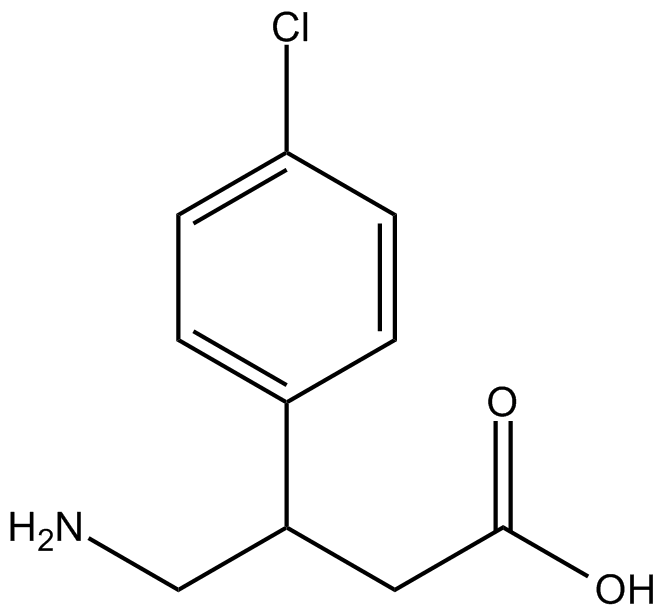(±)-Baclofen |
| Catalog No.GC12927 |
A GABAB agonist
Products are for research use only. Not for human use. We do not sell to patients.

Cas No.: 1134-47-0
Sample solution is provided at 25 µL, 10mM.
IC50: 200 nM: a selective agonist of γ-Aminobutyric acid metabotropic receptor (B) (GABAB).
(±)-Baclofen, a selective agonist of GABAB, causes skeletal muscle relaxation and inhibits spasticity via triggering GABAB. (±)-Baclofen, as an active anti-craving medication, modifies animal responses to alcohol and cocaine. γ-Aminobutyric acid (GABA), an inhibitory neurotransmitter, acts via heteromeric ligand-gated ion channels, GABAA and GABAC, and a G protein-coupled receptor, GABAB.
In vitro: (±)-Baclofen dampened cell growth in human hepatocellular carcinoma (HCC) cells in a dose-dependent manner. (±)-Baclofen also caused cell cycle arrest at G0/G1 phase without inducing cell death. Additionally, (±)-baclofen-evoked HCC cells proliferation was associated with down-regulation of the intracellular cAMP level, up-regulation of p21WAF1 protein expression and its phosphorylation level, which could be reversed by pretreatment with the GABAB antagonist, phaclofen, indicating that (±)-baclofen-evoked growth blockade was exerted in a GABAB-dependent fashion [1].
In vivo: The mice, subcutaneously injected with Bel-7402 cells, were given an intraperitoneal injection of (±)-baclofen 30 mg/kg every day for 30 days. Compared with the control, (±)-baclofen remarkably blocked the Bel-7402 xenograft tumor growth without causing toxic effects via measuring the relative tumor volume and the mean body weight change in (±)-baclofen-treated groups, which could make (±)-baclofen as an effective and relatively safe potential drug for the treatment of HCC [1].
Reference:
[1]. Wang, T., Huang, W., & Chen, F. Baclofen, a GABAB receptor agonist, inhibits human hepatocellular carcinoma cell growth in vitro and in vivo. Life Sciences. 2008; 82(9-10): 536-541.
Average Rating: 5 (Based on Reviews and 3 reference(s) in Google Scholar.)
GLPBIO products are for RESEARCH USE ONLY. Please make sure your review or question is research based.
Required fields are marked with *




